#Content Samurai Review
Explore tagged Tumblr posts
Text
Okay I’m gonna talk about the Samurai Rabbit show
So first of all I read a lot of the old comics before I started watching the show. Putting that out there because some people think it’s not valid to analyze an adaptation when they don’t have context of the source material. This is incorrect, but not the point.
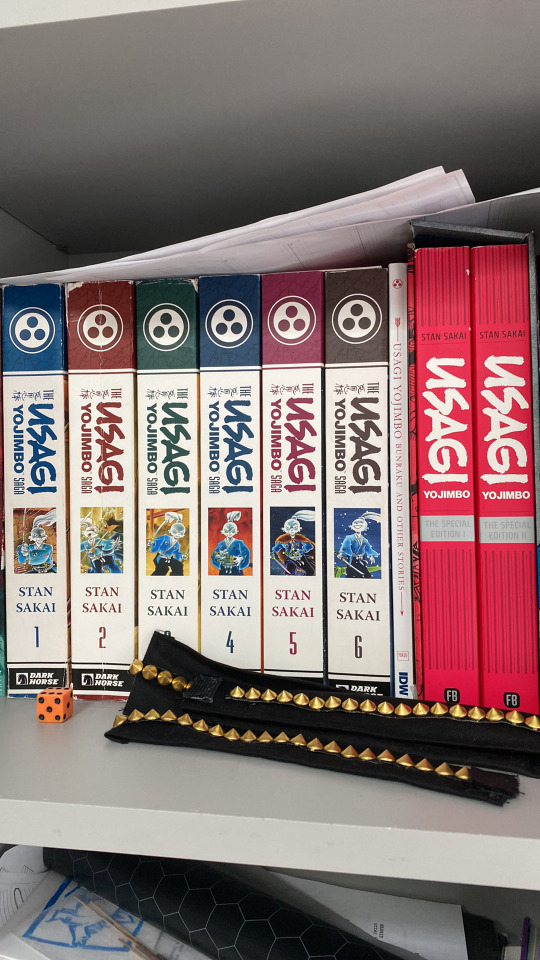
I was excited to have an animated series (as we all were). And I'll admit, when I first turned it on, I was kind of turned off. It took me a little while to really get into it. As such, I'll totally understand people who just didn't find it for them. I'm just here to talk about my experience watching (most) of the show. Because I hardly hear anything about this show online; I either see Rise of TMNT crossovers (a much more popular fandom) or see a lot of people really hating this show. Whenever I see that kind of attitude for a reboot/adaptation, I always wonder how much of the backlash is that phenomenon of people hating it on principle and not appreciating its merits. So I'm going to say this:
Did I want a show that captured the epic scale and action of the original? Absolutely.
However, did I still like the show outside of that context? I'd honestly say yes. I enjoyed a lot of aspects of the show, and I'd like to discuss them.
The world was pretty fun. I'm a sucker for traditional old timey x cyberpunk aesthetics. It was an interesting direction for Usagi, so it kept my attention. This was also true for the way it reimagined some of the characters. I mourn the loss of Tomoe, but I think the characters they chose for the "main team" made for a diverse group. The same goes for some of the new characters, too. The sentient car and the bird yokai were some standouts. While everyone knows the animation is not stellar, I thought a lot of the character designs were quite nice. If it had been 2d animated with the same designs, it would have looked a lot better. Sometimes the writing was kind of funny, beyond typical "kid show" stuff. It was also surprisingly brutal sometimes, too. Like, they really went with "They'll be cleaning you off the walls when I'm done with you." The lore and story was so wild. I mean "evil aliens from another dimension and we have to fight it with the magic sentient rock" is absolutely crazy. But that's what was fun about it!
So generally, I had a really fun time with this show. Everything about it was so wild and insane (even outside of the context of the comics) that I couldn't not have fun with it. While it wasn't always executed that well, I liked a lot of what they were trying to do and generally enjoyed watching the show. I even thought aspects of the show were genuinely good. It really did remind me of ROTMNT in that way. I can see why they're often compared.
#tbh i'm just kind of tired of only seeing rise crossovers#i like rise a lot but can i just see content about the regular show?#usagi yojimbo#usagi yuichi#usagi chronicles#samurai rabbit#rotmnt#tv review
19 notes
·
View notes
Text
Sorry my brain is being silly and it just went "how would the aa characters use a youtube channel" so now here's your list of that
Phoenix: you would think he wouldn't have one, but he does and the only thing on it is the ad he and Maya made in the anime Maya: Runs a Steel Samurai analysis/review channel called Real Pink Princess that has over 100k subs. The most popular video is one that features Will Powers as a guest. Sometimes there will be unexpected breaks and when she gets back she's like "sorry guys I got arrested!" and at this point none of her subs know if she's joking or not. Pearl: Does not have a youtube channel but likes to help Maya and Trucy with editing. Ema: Her youtube channel is only a mirror for her tiktoks. Those tiktoks being incredibly ridiculous, sometimes dangerous science experiments and also explaining how forensics stuff work. Trucy: Posts her magic acts on her channel and has some videos teaching people how to do some more basic tricks to try to get people more interested in magic. Generally good vibes
Edgeworth: Does not have a youtube channel but is a frequent guest on Maya's channel. The fans love him. Kay: Makes clickbait videos called stuff like "BREAKING INTO THE CHIEF PROSECUTOR'S OFFICE!!!!" and has millions of subs. Was notorious during the prank era of youtube despite never doing anything harmful. Also has a gaming channel. Apollo: Only has a channel in name. Nothing is posted on it, but he is subbed to a lot of law-based content and an astrology channel. By nature of being Trucy's magic assistant, it goes without saying that he is in a lot of Trucy's videos. Klavier: Ran the official Gavinners youtube channel up until Turnabout Serenade happens. Afterwards made a new channel for his own music but has kept it very lowkey. Athena: Has a vlogging channel that she started when she was 14. She has a small but supportive fanbase of people who are rooting for her in her lawyer/psychology endeavors. In the DD and beyond era she makes more videos about law and psychology but never full out stops with the vlogs (those Khura'in videos must've been wild) Simon: Makes a channel after getting out of prison. It's low quality videos of Taka and nothing else. It goes viral and someone tries to get him "cancelled" by exposing his criminal history but it fails spectacularly Bonus: Once out of prison, Godot also makes a youtube channel, which is how to make every single Godot Blend. It's not popular but the people who come across them are concerned for his health
#aj rambles#ace attorney#ace attorney headcanon#uh#idk this is a shitpost not srs post#phoenix wright#maya fey#pearl fey#ema skye#trucy wright#miles edgeworth#kay faraday#apollo justice#klavier gavin#athena cykes#simon blackquill#godot ace attorney
264 notes
·
View notes
Text
Tmovie - Devasa+
The films have been around for centuries and are often revered as some of the most influential films in cinematic history. From Akira Kurosawa's samurai epics to Zhang Yimou's comprehensive martial arts dramas, these films have captivated audiences around the world. With so many classic Asian movies it can be hard to know where to start. Movies and serials are an integral part of the history of cinema. There is a wide variety of genres and stories told, from classic samurai movies to modern day romantic comedies. The Universal Movie Database (UMDB) or International Movie Database (IMDB) is a great resource to discover the movies you're looking for. It contains information about more than 50,000 movies from all over the world and provides users with detailed movie reviews, movie guide, movie trailers and other related content. Additionally, UMDb also has a movie guide that helps users find movie database or Films database on their preferences and interests. With its extensive international movie library, UMDb is an invaluable resource for discovering what you want to watch. Fortunately, there are several movie databases that can help you find the perfect classic Asian movie for your viewing pleasure. Whether you're looking for a specific genre or period, Tmovie provides detailed information about each movie's plot, cast, crew, and more. With this information at your fingertips, you can easily find the movie that suits your taste!
1K notes
·
View notes
Text
#SamuraiSkirts #MOBA

Expanding on the gameplay of SamuraiSkirts, a MOBA (Multiplayer Online Battle Arena) game, involves a deep dive into its mechanics, world-building, and strategic nuances. Here's a more detailed exploration:
Game World and Lore
Setting:
SamuraiSkirts takes place across a multiverse of arenas inspired by historical and fantastical Asian cultures. Players battle in environments like:
The Ghost Town Shinto Shrine (a haunted ruin of ancient Japan).
The Crystal Pagoda (a floating battleground filled with fragile crystal pathways).
The Midnight Sakura Gardens (a maze of blossoming trees and hidden ambush points).
Each map introduces unique hazards—e.g., the shrine’s crumbling floors or the garden’s stealth-friendly foliage.
Faction Lore:
Players align with factions like the Four Winds (Fire, Water, Earth, Air) or Mythical Blades Guild, influencing their abilities and unlocking special items tied to their chosen faction.
Gameplay Mechanics




Battle Doll Classes:
Each Battle Doll belongs to one of six main classes, each with strengths, weaknesses, and customization options:
Samurai: Fast, dual-wielding warriors with devastating mobility-based attacks.
Cleric: Healers and support units capable of boosting allies and disrupting enemies.
Mage: Ranged attackers with high-damage spells and area control.
Assassin: Stealthy, high-damage characters who excel at surprise attacks.
Tank: Durable front-liners with crowd control and shield-based defenses.
Round Class: Versatile fighters who adapt to melee, ranged, and mid-range combat.
Customization:
Players equip their Battle Dolls with DressBlades (like Bebe’s Blade of Fire), Battle Accessories, and DressSpheres to enhance stats and unlock unique abilities.
Cosmetic options (e.g., skins, voice packs, emotes) personalize each doll.
Combat Features:
Lane Strategy: Teams are divided into lanes (top, mid, bot) and jungle zones, requiring coordination to control resources and objectives.
Dynamic Objectives: Maps include objectives like:
Capturing ancient shrines to summon a temporary ally.
Securing "wind gates" that provide mobility buffs.
Skill Combos: Each class has skill chains that can be combined with allies’ abilities for powerful effects (e.g., a Mage freezing enemies while a Samurai delivers a finishing blow).
Progression and Strategy
Leveling Up:
Players earn XP by defeating enemy dolls, minions, and completing objectives.
Each match allows for in-game skill tree progression, letting players adapt their playstyle mid-battle.
Item Economy:
Collect Elemental Shards and Mythic Coins during matches to purchase gear upgrades and potions.
Specialized items, like Sacred Wards or Blade Enhancers, can turn the tide of battle.
Team Coordination:
Victory depends on team synergy:
Tanks initiate fights, absorbing damage.
Assassins flank enemy backlines.
Clerics maintain healing zones and buffs.
Unique Gameplay Features
Summons and Champions:
Players can summon legendary NPCs or creatures from the game’s lore, like Phoenix of Fire or Koi Dragon of Water.
Summons temporarily shift the battlefield dynamics, forcing enemies to adapt.
Dynamic Weather:
Certain maps have real-time weather effects that impact gameplay:
Rain reduces visibility and boosts water-based attacks.
Windstorms scatter projectiles and open secret pathways.
Replay Mode:
A cinematic replay system allows players to review their matches with customizable camera angles and editing tools for content creation.
Expanded Example Match
The team of Skitts continues in their queue. After their first victory, they are matched against another team of equal skill. The match begins in the Crystal Pagoda.
Opening Strategy:
Bebe's Sakura Blade Asterid takes the mid-lane to face an enemy Mage.
Nikkia Belle’s Round Class moves to the top lane with TVD’s Samurai to apply pressure.
Chloe's Cleric and IshiiORen2.0 support the bot lane, securing early objectives.
Mid-Game Chaos:
The enemy team activates a Wind Gate, enabling their Assassin to leap between lanes and ambush Nikkia.
Bebe counteracts by using her Fire Wave Ultimate, dealing massive damage and forcing a retreat.
Climactic Finish:
With both teams neck-and-neck, the Phoenix of Fire objective spawns.
Bebe’s team fights off waves of minions while IshiiORen2.0 heals the squad.
The final blow is landed by Bebe’s DressBlade, unleashing a fiery explosion that wins them the match.
SamuraiSkirts seamlessly blends strategy, customization, and lore to create a rich MOBA experience. What other features or expansions would you like to explore? Perhaps a story mode or eSports potential?
13 notes
·
View notes
Text
Review of Blue Eye Samurai on Netflix
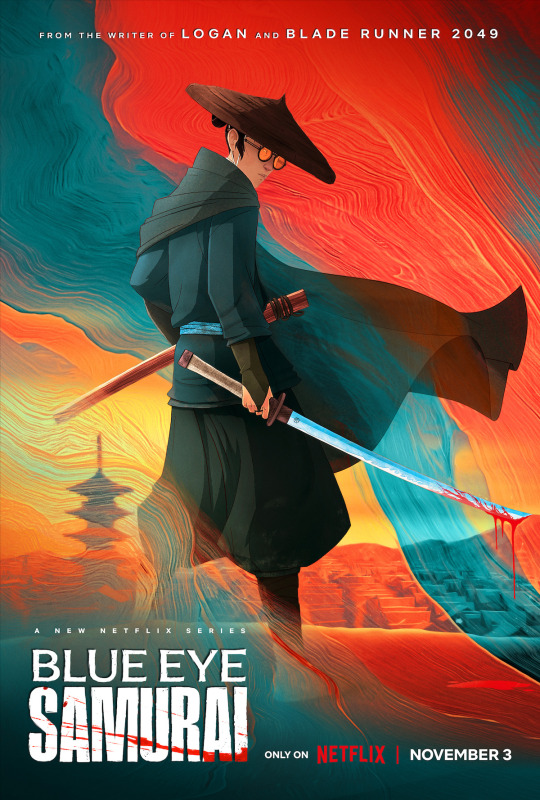
There are some spoiler-ish things below, but I think most of it is in the trailer, so I don't think I will ruin anything. I'll warn you during the most spoilery section, though the show makes the "twist" pretty obvious from the beginning.
Premise
Blue Eye Samurai is a Kill Bill-style revenge tale that takes place in 17th century Japan. The samurai is half white/half Japanese. The show states that no white folks were allowed in the country back then, so the samurai tries to conceal blue eyes with some sweet BluBlocker™ orange glasses. The Samurai is displeased to have white heritage and decides to try and kill all the "white devils" hiding in Japan.
Will some reactionaries complain there is a show all about someone trying to murder white people? I have no idea. But they're all bad white people, so I'm hoping it won't become a thing.
My Hot Takes
A few episodes meandered a bit, but I enjoyed the series as a whole quite a bit. If nothing else, the sword fights were epic and bloody. I would have watched it for that alone. And there is some gorgeous art direction where they really take advantage of the 2D styled, 3D animation. Plus, Japan is just really pretty. There is also a puppet show that was brilliantly mixed in with the story and the way they animated it was next level awesome.
They fell into cliche a few times. I think they were trying to do homages and tributes but ended up in Derivative Land and some of them felt a bit cringe.
They used "Battle Without Honor Or Humanity" which is that rousing instrumental song from Kill Bill and it was way too on the nose. Like, yes, this show is obviously a 1600s version of Kill Bill, but you're not supposed to make it that obvious.
Also, there was a Metallica song that equally made me roll my eyes and think, "That is badass" so I give them a pass on that one.
And there were a few sections where it felt like you were watching someone else play a video game. I don't know how else to describe it. As if the narrative melted away and suddenly a bunch of Prince of Persia obstacles appeared.
That said, the story was enjoyable, the actors were great, the characters were interesting, the animation was solid, and the fight choreography was top notch.
The nice thing about animation is you don't have to do any jump cuts during the action, so you get to really *see* the fights develop. Thankfully they didn't make use of a lot of impossible-in-real-life camera moves, so it all felt very grounded. As if these fights could actually be filmed in live-action. I suspect they may have even used motion capture or closely adhered to reference footage. Most of the non-fantastical choreography felt like something a stunt performer could actually do. They even had some legit Japanese samurai-style sword fighting moves before it got to the "John Wick with a katana" part of the show.
Back in the day, samurai duels were more akin to jousting than fencing and usually only lasted one or two moves. It can be pretty exciting as long as you build tension and anticipation. But if every sword fight in the show was like that, it would probably get boring. But it was still nice to see it toward the beginning.
So the quality was a bit roller coaster-y at times, but I think it was a solid first season. And I am really hopeful they get a chance to smooth things out in a second. But it is Netflix, soooooo...
As far as content warnings, there is a lot of blood and sex and nudity. Women are very subjegated and some of those depictions are rough. There are some brutal torture scenes. And I think there is implied rape, but it isn't made super clear.
The nudity was surprisingly balanced which felt refreshing. So get ready for boobies and floppy cartoon peens. All the genitals get screen time.
Quick aside about erotic scenes...
There has been recent discourse about nudity and sexy time in media. My biggest issue has always been that men's bodies are rarely shown aside from the patoot. It is never balanced and I always felt uncomfortable with that arrangement. I know movies are a bit stuck because the MPAA has decided dicks in a sexual context are an automatic NC-17. But even in newer HBO-type content where they do show penises, they are usually prosthetics. Hyper real fake dicks on top of real dicks that probably cost tens of thousands of dollars to develop and apply.
Like, the folks with boobs don't get expensive prosthetics. Only the most famous actresses can opt for a body double. For years, if an actress wasn't willing to get naked they would just say, "Well, I guess we'll just have to find another actress."
And now if a guy doesn't want to get naked, apparently the response is, "Don't worry, we'll raise Stan Winston from the dead so he can make you a perfect megadick."
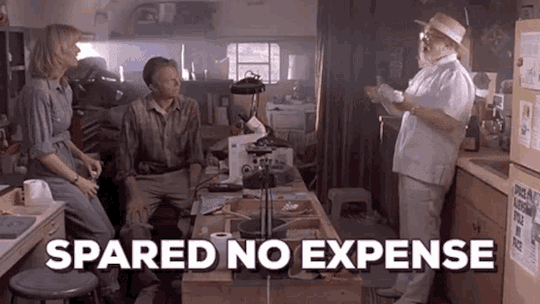
Women are usually asked to do the brunt of the nudity and I have long felt that wasn't fair and it was exploitative whether intentional or not.
I just think if you are going to ask actors to be vulnerable, everyone should do it or no one should do it.
I also think we need to see more normal non-porn genitals. Like, you can't brag about your progressive all-inclusive nudity if you slap a giant fake wang on every time.
/end tangent
And now, the spoilery part...
The big twist, which is really only a big twist for a character in the show and not the audience, is that the Blue Eye Samurai was born a girl. To avoid capture and death they essentially hid in a different gender identity. And I'm trying to decide if this is a trans story or not.
Sometimes it felt like the show was bluntly saying, "She's a girl. See, she has boobs and no penis. And we make a big deal about her getting caught naked. It's like Mulan!"
But then the show kinda/sorta implies that while identifying as a man was a tactic at first, the Blue Eye Samurai came to feel much more comfortable as a man most of the time and only revealed their feminine attributes to a select few. They also had a binding scene which felt like intentional trans imagery.
Since there wasn't the same concept of trans-ness in 1600s Japan as we understand it in modern times, I'm having trouble determining if this is just an homage to Mulan that wasn't thought very deeply about, or if this is allegory exploring a trans identity.
It is unclear if the identity was chosen purely out of necessity or if there was more to it.
Was it like... they tried on a coat because it was cold, but then they really liked how it fit and made it an essential part of their wardrobe?
Or was it just pure pragmatism? If they don't wear the coat they will die from exposure.
I'm worried they wanted to stay close to that line where they could say it wasn't a trans story if that ended up being more convenient. I don't know. I'm fine with allegory and I really enjoyed how they did it with Nimona, but this felt more deliberately ambiguous and it frustrated me a bit. It would be nice if we could just have blatant trans stories that didn't need to hide in ambiguity to avoid controversy. But maybe there were more obvious things I missed and my confusion is unwarranted.
I also think an argument could be made for ol' Blue Eye being genderfluid. Actually genderfluid would make a lot of sense. Their masculine side is the stoic warrior and their feminine side is their vulnerability, love, and humanity—reserved only for those most trusted. And when the two blend and they are a warrior woman they get super horny. So the entire spectrum is there.
I'm sure there will be a long complicated video essay analyzing this gender dynamic.
/end of spoilery section
In any case, I think if you liked Kill Bill, this might be a show that interests you. It has much less cultural appropriation and blatant stereotyping. No Pussy Wagon, but there is a cool horse. And they did use an all East Asian voice cast, so that representation was cool. And the co-showrunner was Japanese, and I think that influence definitely made a difference.
I give Blue Eye Samurai 7.5 Froggies out of 10.
43 notes
·
View notes
Text
Samurai Champloo Review
What the hell even is a 'champloo' anyways? Ever since one fateful Passover seder, where my older cousin told me about this series, I've wondered about it. Its certainly not English, and though a quick Google search could give me my answer, the mystery of it all kept this show on my radar for nearly a decade. Its not often that a show with a title as puzzling as this get popular, especially enough for my slacker cousin to recommend it to me. With a recommendation like that, though, I knew there was something special about it.
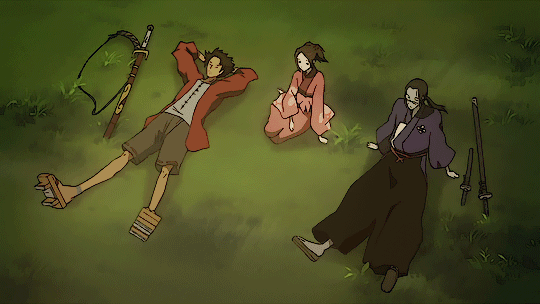
Samurai Champloo is a strange breed. Created in 2004 by Masaru Gotsubo, and animated by defunct studio Manglobe, the series follows a trio of miscreants on a journey to find a mysterious samurai. Along the way, they dodge the law, fight assassins, and discover how hard it is to be a minority in a changing world.

Champloo's biggest draw is it's style. The series features a modern-style Edo that keeps the historical dress and architecture, but adds a contemporary kick everywhere else. The opening alone sets the tone perfectly: sharply colored characters, juxtaposed onto paper-like backgrounds, moving to a hip-hop flow. Its stylish, like an old-school music video, and draws you in in seconds with its funky beat and striking visuals. Its the perfect opening, and things only get cooler from there.
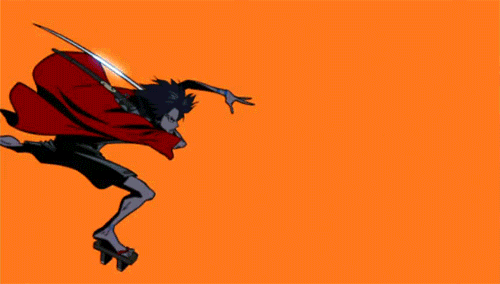
The Edo of this anime features a mix of traditional Japanese and modern North American styles, presented in a way that sets it apart from the rest. Its a show where you might find a samurai sword fight set to record scratches, or characters wistfully embarking on a journey while hip-hop music plays in the background. Early episodes use these scratches in the soundtrack as editing cues, cross-cutting between actions at the sound to create a wholly unique experience. It can't be overstated how much the musical styles of this anime make the viewing experience shine.

On top of that, much of the content of the show's episodes takes pages from a more modern handbook. One episode has the main trio caught up in the world of graffiti, as two brothers compete to see who can 'tag' the most dangerous places. Another has them play against American traders in a overly-violent game of baseball. All the while, characters talk with modern slang, ditching formalities and keeping with the tone the soundtrack sets. All this combined creates a historical anime that feels surprisingly contemporary, despite the obvious.
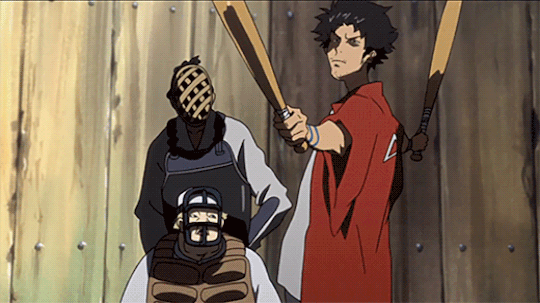
Over the course of the show's 26 episodes, we follow a main trio of characters as they journey to find a mysterious samurai who smells of sunflowers. The trip is long, and each episode usually features the gang stopping somewhere and getting involved in a stranger's problems, usually learning some moral or getting a lead on their quest afterwards. Its not often for series as mature as these to be episodic, given how seriously they take their plots, but here, it works well.
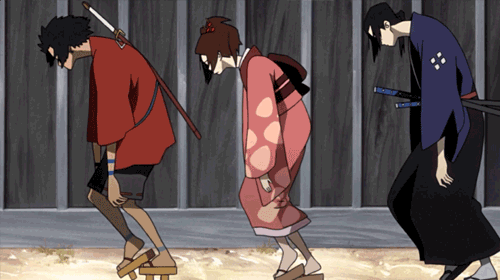
Every episode feels like another step along their journey, whether it be an eating contest in a big city, or hunting down a pick-pocket who stole their wallets. The series also does an excellent job at making the journey feel long, often referring back to the places the characters have been so far to keep track of it. You could actually track the trio's journey with a real life map if you wanted, since all the places they visit are historical, and probably still exist. Maybe someone out there has even tried their journey in real life...?

An anime is only as interesting as its main characters, and this one certainly has an interesting cast. The series stars three characters, who together, always find a way to screw things up in the most hilarious ways. First, there's Fuu, a young woman who meets the other two characters when they burn her workplace down, and enlists them to help find the samurai who smells of sunflowers. The show pulls no punches with her, often having her be the butt of the joke just as much as her companions. She's loud, whiny, naïve, and often eats the most out of all of them. Yet, she's usually the one that stops fights, is the voice of reason in all this show's chaos, and shows kindness to everyone she meets, even someone who tried to kill her. Though the other characters might play her off as another nagging woman, Fuu's right more often than not, and is a valuable member of the team.
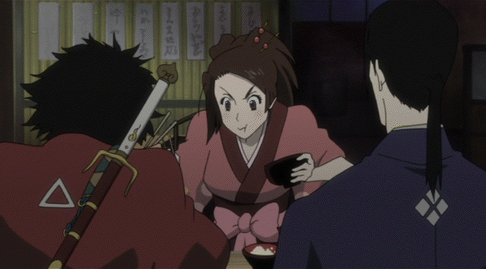
Next is Jin, a ronin with a cool attitude. He's the level-headed one of the trio, often keeping to himself instead of jumping into arguments like the others. His cold exterior hides some pretty deep traumas, which were exciting to learn more about as the story developed. Characters like him are often stereotyped as unfeeling swordsmen, yet beneath all the sullen glances and reclusive body language, he grows to care about his companions more than any sense of pride.
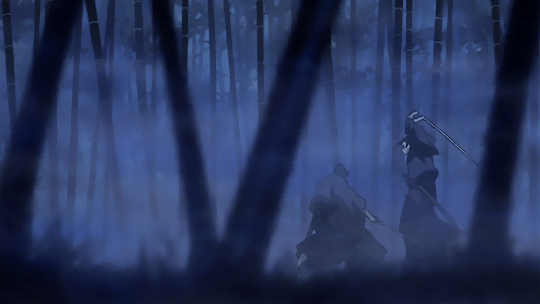
Lastly, there's Mugen, the wild vagrant. His reckless fighting style, love for battle, and unquenchable pride endeared him to me pretty quickly, making him an easy choice as favorite. Compared to Jin and Fuu, Mugen is an old-school tough guy, a shonen protagonist aged up a decade and thrown backwards a couple hundred years. Like Jin, he initially is quite guarded, but learns to express himself little by little, eventually revealing his tragic backstory. Though, to be fair, most of his self expression comes in the form of violence or threats, but I'm not here to judge him.

Together, these three form a simple comedy trio, and get into trouble at every turn on their journey as they learn to tolerate each other. From start to finish, the trio struggle to get along peacefully, but that's what makes their dynamic worth watching. Mugen and Jin's mutual hatred, balanced out by Fuu's persistence, is what keeps them going. Depending on what episode it is, they take turns being the 'straight man', keeping the dynamic fresh and free of stale tropes.

At the heart of this anime, though, is its theme of identity in a changing world. Throughout the series, the trio encounter various minority groups along their journey, and learn about their unique struggles. One episode has them protecting a secret Dutch immigrant, taking him on a tour of the city while they dodge immigration officers. When the man reveals that he fled his home country because of homophobia, it doesn't feel out of place or poorly handled. His queerness is just as much a part of his character arc as his foreign-ness, and though the show makes a few light-hearted jabs at his accent and obvious visual difference, it takes the rest of his identity rather seriously. This character, while only in the show for an episode, is just one of many minority characters in this series that is handled well, showing that a series doesn't have to be disrespectful to be historical.

Another major theme in this series is death, and the acceptance of it. Being an action series, its pretty obvious that a lot of characters die, but what's interesting is how other characters deal with those deaths. Many side characters who the trio befriend on their journey are dealing with loss in some way, whether it be a husband, sibling, child, or something else. We witness how their grief drives them, such as with Fuu, or various other characters in the series. In a world such as the one in this series, death is commonplace, but a healthy acceptance of it is unfortunately less so. Each encounter with death in the series opens up new discussions about it, and often had me pondering what these characters might do next, or how I would deal with their situations.

In the end, though, Samurai Champloo is a fascinating series that brings a unique blend of Eastern and Western styles to make a truly memorable viewing experience. It's hip-hop soundtrack pairs beautifully with flashy and quick-paced sword fighting, creating a simultaneous modern-historical vibe to it all. Its characters have an enjoyable dynamic that kept me coming back day after day for more, which inevitable led to disappointment upon discovering how short this series is. If we lived in a perfect world, this would have at least an extra season, but unfortunately, perfect this world ain't.

But hey, at least I can spend my Pink Halloween (read: Valentine's Day) knowing that Fuu is valid, Mugen is gender, and Jin defintely got pegged in that one episode.

#anime and manga#anime review#film critic#review#anime#anime critique#animation#animated series#samurai champloo#otakucore
27 notes
·
View notes
Text
Blue Eye Samurai - Season 1 (2023) Review
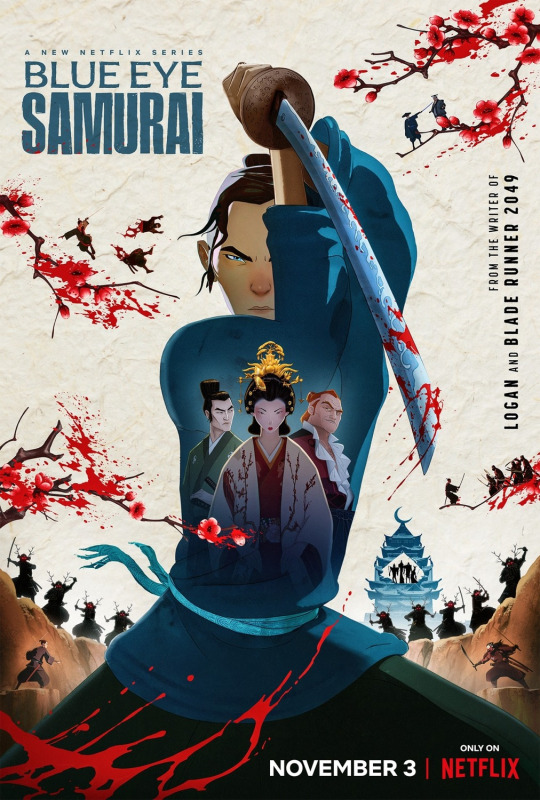
Don't think I've ever seen so much human genitalia in animated form all in one go. Makes me wonder if the production team had a designated animator of genitals who literally just spent his time drawing penises for the show. If so, I hope it was Jonah Hill as he already proved in Superbad that he is the perfect artist for this subject.
Plot: Driven by a dream of revenge against those who made her an outcast in Edo-period Japan, a young warrior cuts a bloody path toward her destiny.
Netflix consistently hashes out so much content every week, that it is hard to keep up with any of it, as such many great projects get missed and are forever lost in the streamer's endless library void. Luckily Blue Eye Samurai didn't pass my scrolling and evidently has its fan base, as this is one of the quickest examples of the streaming giant announcing a season renewal after release. Yep, Blue Eye Samurai will be getting a second season which is amazing as this is a superb new series that if you haven't yet discovered then you are doing yourself a disservice and should amend that behaviour immediately and go watch it! Still need persuading? Alright, sit yourself down and allow me to gush about Blue Eye Samurai!...
It’s hard to overstate just how stunning Blue Eye Samurai is to look at. The series uses a mix of 2D and 3D animation styles to create landscapes and characters who seem only a few degrees removed from live-action, even as the form allows for combat on a scale that would cost several large fortunes to craft with flesh-and-blood actors. In fact, looking at the behind-the-scenes the team hired an actual martial arts choreographer to support in creating the combat sequences in real life with real people, and then the movements of those fights were transferred to animation and used in the final product. In one episode (seemingly inspired by the 1978 martial arts film Enter the Game of Death where Bruce Lee had to fight his way up to the tower to get to the last floor) the main samurai Mizu must defeat multiple bosses on each level of the season's big bad Fowler’s impregnable fortress home, and each separate battle is a work of art in itself. Honestly, the show just looks like a moving painting, with every frame absolutely jaw-dropping gorgeous. Even without dialogue or characterization, it would be completely engrossing.
Luckily, writers Michael Green and Amber Noizumi are as interested in the people at the center of these crazy fights as they are in the many improbable techniques Mizu uses against her opponents. Mizu is presented throughout as both supernatural and deeply human. She can handle any odds, and come back from every injury that would cripple or kill a normal person. But the series never loses sight of what a life wholly devoted to revenge has cost her, and the ways in which she has turned herself into every bit the monster that her countrymen believe her to be.
It is then also the exploration of how Mizu interacts with the other characters in this world. There's the disabled would-be apprentice Ringo (played warmly by Masi Oka), who has learned to navigate life despite his lumbering size and lack of hands. Mizu has no interest in a sidekick, but Ringo gradually wears her down, as if he’s a peaceful stream flowing against a rock over hundreds of years. There's also Taigen (Darren Barnett), a warrior chasing after Mizu to collect a debt of honour, yet due to this honour he ends up helping her as in his eyes only he has the right to kill her, no one else, so ends up attacking those that attempt to harm her. Brenda Song voices the princess Akemi, who is just as eager to escape the bonds of Edo society as Mizu is, but who uses very different methods to achieve that. We follow her journey through an intimate tour of the area brothels, which is where the aforementioned heaviness of nudity comes in. There is, in fact, a lot of naked flesh on display throughout the season. The series can be just as graphic in depicting sex as it is in violence, yet both avoid feeling gratuitous. And finally, there's Kenneth Branagh as this season's big bad Fowler, a despicable arms dealer who has no sense of morality or empathy and is willing to destroy anything standing in his path. He's a massive presence and seemingly the only one able to hold himself in a fight against Mizu, hence why Branagh's British snark yet heavy tone fits perfectly here.
The whole thing is an incredible, utterly badass example of how animation can be used to create worlds, characters, and adventure every bit as vivid as live-action if not more at times. Even though I would say there are a few areas of pacing issues, which withheld me from binging this season all in one go and instead had me taking regular break intervals throughout, this is still a stellar show and one that you can tell was created by a team of passionate filmmakers and artists. Blue Eye Samurai would never have had the impact it did had it been live-action - using animation as its storytelling medium elevated it to a masterpiece in my opinion. Kudos to everyone involved in such an amazing project and I can’t WAIT to see more!
Overall score: 8/10
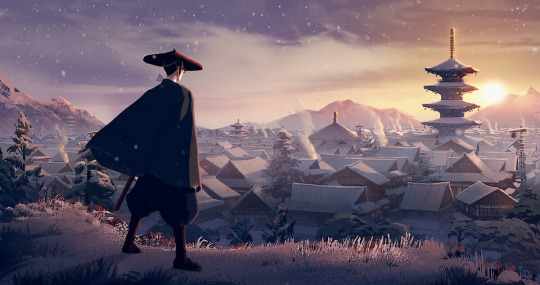
#blue eye samurai#mizu#adventure#thriller#action#animation#digital animation#2d animation#netflix#michael green#amber noizumi#maya erskine#masi oka#brenda song#george takei#randall park#kenneth branagh#darren barnet#2023#blue eye samurai review#tv series#streaming#samurai#adult animation#history#drama#sword#blue eye samurai season 1#martial arts
20 notes
·
View notes
Text

A 17th Anniversary Retrospective Of Lupe Fiasco’s The Cool
Rapper Lupe Fiasco is somehow the most underrated popular rapper. That’s an oxymoron, I know, but despite having a top ten hit in the 00s, he’s been largely forgotten about, at least in the mainstream. Not in the underground, where Lupe is still a critical darling. I just reviewed his newest album, Samurai, and it’s a great little rap album that showcases the best of his sound, all the while only being a half hour long. A lot of rap albums tend to be over an hour, which is a long time to spend with any album, but I can understand if that’s a detriment to getting into the genre. Not everyone has the time to spend with so many albums, or let alone the patience, whether it’s just exhausting or dense. Some rap albums can be dense listens, mainly for their lyrical content, but also for its production and sound, but Samurai is right to the point. It’s a half hour jazz-rap album that does its thing, all the while showing how good Lupe is all these years later. Even almost 20 years later, after his debut album, he’s still delivering really solid bars, production, and flows.
Lupe is one of those rappers that you just know you’re getting quality from, no matter what you hear, and that’s true. I’ve been a fan since 2015, back when I listened to Tetsuo & Youth, and I thought it was a cool album, but it was a dense and long listen. I was new to the genre still, only being into rappers like Childish Gambino, Chance The Rapper, Tyler The Creator, and a few more, but Lupe Fiasco’s brand of rap is lyrically dense, fast-paced, and intense at times. It’s still catchy and fun, but when an album is 70 minutes and over, it can be a lot, especially when not every song is a winner. I realized that after listening to Samurai that I haven’t listened to any of his first three albums. That’s when Lupe was in his prime, and when the mainstream cared a lot about him.
It worked out, too, because I found a vinyl copy of his sophomore album, 2007’s The Cool, for $20 on Amazon, when it was originally $40. Now would be the best time to listen to that album, so I’ve been listening to it for the last couple weeks, and I wanted to talk about it, albeit in a retrospective format, versus a full-on review. This album is considered a classic in the hip-hop community, and it’s easy to hear why, because this album is wonderful. I’ve had a lot of fun with this album over the last couple weeks, but I haven’t been going back to this one as much as Samurai, or as any other albums I’ve been spinning. I’ve been wondering why I haven’t gone back to this as much, but it dawned on me today. That’s what made me finally sit down and write this, but it’s because this album is a little too long and self-indulgent for its own good.
This album is 71 minutes long, and that’s not bad on its own, but the biggest issues I have with this album isn’t really with the music itself, it’s more so with the presentation and how there are so many ideas thrown into this album that it becomes overstuffed. I feel like this album runs out of steam by the last third, and with the last five songs, I sort of just zone out. With that said, this album is still a classic, because Lupe shows that he’s a great and versatile rapper, as well as a complex and clever lyricist with a flair for higher concepts and ideas. Some of those concepts don’t work too well, or at least as well as he thinks they do, but it’s not much of an issue when the music itself is good. A lot of the hooks on this album are killer, especially the top ten hit “Superstar,” “Gold Watch,” “Go Go Gadget Flow,” “Hip-Hop Saved My Life,” and a few more tracks, but Lupe is a great singer, too, and that’s something people don’t remember that much.
If anything, this album just suffers from having peaks and valleys. The peaks are just so high, it makes the valleys that much more noticeable. The last five songs on this album just don’t do much for me, and I zone out each time, unfortunately, but there are a lot of great tracks in the meantime. Like I said, Lupe sounds amazing, and for that alone, this album is worth hearing, but it’s kind of dense at times, namely for his lyrical content and how fast and technical he can rap.
That’s impressive on its own, but a song like “Little Weapon,” for example, is about guns and their relationship to children, whether it’s child soldiers in Africa, high school shooters, or kids who play violent video games and how they’re exposed to that kind of violence at such a young age, and that’s kind of a heavy topic. The song itself is quite good, both for Lupe himself, but Fall Out Boy frontman (and fellow Chicago native) Patrick Stump produced this track, and it sounds cool. Lupe would actually appear on Stump’s debut solo album on a remix of “This City” in 2011, and that’s how I found out about him at first. Anyway, the lyrical content can get heavy at times, and despite the songs being catchy a lot of the time, this isn’t really music you could play in the background or play for someone that doesn’t want something super dense or meaningful.
Samurai, though, is an album I could listen to whenever, because despite having complex and interesting lyrics, they’re not as heavy or intense as The Cool. The song “Dumb It Down” actually addresses that, and talks about how Lupe has to dumb down his music to sell records, so the hook is very simplistic and catchy, whereas his verses are complex. This record is a classic, and I can see why people absolutely love it, but it’s a lyrically dense album that’s still catchy and fun. I just don’t go back to it very much as other albums, because of how long it is, and how this album has its peaks and valleys. As an introduction to Lupe, this would be a good one, and The Cool is an album that people still talk about 17 years later, for good reason.
4 notes
·
View notes
Text
Manga Review: 'The Valiant Must Fall' #1
The Valiant Must Fall #1 by Yu Aida

culture studies
fantasy
historical fantasy
historical drama
historical fiction
Meiji Japan
samurai
My Rating: 4 of 5 stars
Japan is changing. Regional alliances have been winnowed into nothing. Historical family dynasties have been felled by their own blades. Federated police units enforce strict new public codes of conduct. A new government for a new era.
Also, the samurai is functionally extinct.
THE VALIANT MUST FALL v1 pulls readers into the travails of a purpose-driven warrior out of time and place in the age of the Meiji Restoration. Oniuda Haruyasu is ill-fated; he is one of a handful of lingering survivors of failed rebellions and who brandishes a now-outmoded loyalty to a decapitated household. Haruyasu is a talented swordsman. In battle, his nickname was onikuro, or "black demon." Now, however, he has no master, no goal, and no purpose. He has no one to fight for and no one to defend.
Enter Kyuko Shino, a child of mythos. She is a woman in need of a soldier, an ally, and a conspirator. She is also, incredibly, reluctantly, immortal.
THE VALIANT MUST FALL v1 is part historical fiction and part urban fantasy. Readers encounter beautiful, period-accurate renderings of busy street markets, clothes, buildings, and more, alongside dark and clever variations on humankind's perilous quest for eternal youth and power. Tales of a new government seeking to validate its influence over a curious populace collide and merge with inscrutable legends of a people, retainers, descended from mountain-folk who cannot be killed. Japan is changing.
The samurai is functionally extinct. And a wandering, masterless swordsman falls into favor of an immortal woman with vengeance on the mind.
This manga is remarkable but patient. The plethora of period comics, and samurai content in particular, often shy away from the stoic and transcendent darkness of unyielding loyalty. Not so for this book. THE VALIANT MUST FALL v1 is an unsparingly serious and particular manga: swordsmen are not afraid to kill; corruption and abuse are rampant; madness is around every corner; and kindness and fealty are luxuries often afforded to those incapable of believing in themselves.
Haruyasu enters the employ of the young Miss Shino and is tasked to steal a darkness-infused blade from the Imperial Palace. The reason? Shino desires to end the lives of she and other immortals. Why? Because when blessed with ephemeral beauty or eternal youth or self-healing abilities, the garish faces of the government will surely find a way to mar such gifts. Haruyasu ponders this imbricated torment of torments, but agrees to help. And once more, he is a warrior with a purpose.
This is what a samurai manga looks like when its characters aren't effervescent goofballs, when the creative team actually studies the hand placement and footwork required to deftly wield a katana or wakizashi, and when the narrative is directly influenced by the politics of the time, rather than conveniently standing apart from or ignoring it. This is what a samurai manga looks like when taken seriously, and likewise blended with the steady, unblinking wonderment of a secret hidden in plain sight. Stories of immortal protectors of the palace? Held against their will? And of the humans who serve them as well? Also, perhaps, against their will?
THE VALIANT MUST FALL v1 is for readers who pay close attention to how the wrist bends when a sword is swung (e.g., Haruyasu is quick, but he also knows his limits). It's for readers who enjoy meeting characters who don't dither when circumstances demand quick action (e.g., Shino doesn't hesitate to command the death of a relative who interferes with her cause). And it's for readers who are tired of the impracticality of modern storytelling taking precedent (e.g., the comic focuses on older characters: Haruyasu is 33 years old; Hachiro, an old friend of Haruyasu's and a former shogunate retainer, is 31 years old; Shino, though she looks young, is between 29 and 44 years old). This is a samurai manga with the potential to pull readers into an insightful, new and dark direction.
❯ ❯ Manga Reviews || ahb writes on Good Reads
#writeblr#writing tips#writing advice#the valiant must fall#meiji restoration#yu aida#oniuda#haruyasu#ayame hatamoto senba#kyuko shino#manga#review#goodreads#4 of 5 stars
2 notes
·
View notes
Text
The Evolution of Film Since 1965 (Part 2)
By Cris Nyne
As violence and horror continues to creep out from the shadows of The Sound of Music, the audience’s thirst for the macabre rides the waves of blood out of Kubrick’s The Shining and gets a polish from the cutting wit and engaging storylines from budding filmmaker Quentin Tarantino. Tarantino released his first film, Reservoir Dogs (1991) to tremendous critical acclaim. The story of a bunch of gangsters in a botched diamond heist gone every way but right was a sleek, modern day take on films like Seven Samurai, The Godfather, and Goodfellas. People would leave the theater after Reservoir Dogs feeling as if it was a new genre of film. Vincent Camby of The New York Times writes, “Though small in physical scope, "Reservoir Dogs" is immensely complicated in its structure, which for the most part works with breathtaking effect. Mr. Tarantino uses chapter headings ("Mr. Blonde," "Mr. Orange," etc.) to introduce the flashbacks, which burden the film with literary affectations it doesn't need. Yet the flashbacks themselves never have the effect of interrupting the flow of the action. Mr. Tarantino not only can write superb dialogue, but he also has a firm grasp of narrative construction. The audience learns the identity of the squealer about mid-way through, but the effect is to increase tension rather than diminish it.”
youtube
Mr. Blonde (Michael Madsen) gets down to business in what is a memorable and gory scene.
Movies as outsider-art geared towards niche audiences have leap-frogged from independent production units with lower budgets to big business. As populations grow and the diversity of the public gains strength in their voice through freedom movements, we see larger representations on screen to reflect the changes in global societies and cultures. In 2015, independent filmmaker Sean Baker gave us the fast paced and confrontational film Tangerine. The film is about a transgendered sex worker Sin-Dee Rella (Kitana Kiki Rodriguez) who is released from jail after serving twenty-eight days for helping her pimp/boyfriend Chester (James Ransone). Sin-Dee is catching up with her best friend Alexandra (Mya Taylor), when Alexandra tells her that Chester has been cheating on her. This sends Sin-Dee into a tailspin of fury as the two of them traverse West Hollywood looking for him. Richard Lawson for Vanity Fair states, "Hovering around the film’s edges, and occasionally blurting in, is a biting sense of danger and unease. Being a trans woman of color is a particularly hard road to walk in America, and though Sin-Dee, Alexandra, and the other girls largely concern themselves with more mundane worries, like boyfriends and wigs and poorly attended cabaret performances, Tangerine never quite lets us forget that these women are in a troubling, frustrating state of near constant peril." Transgendered people were not seeing this type of exposure on screen. The actors were chosen from an LGBTQ+ center and had not had any acting experience before this film. Tangerine was also shot using three iPhone 5s and a phone app. This technology fused with a culture of society that was started to gain more acceptance. The film received rave reviews and help solidify Sean Baker as a major talent. In 2024, his latest film Anora would receive the Palme d’Or at Cannes. All his films deal with sex workers in one degree or another, lending more exposure to people who are not fully embraced by society.
youtube
The official trailer for Tangerine.
The social issues that Baker addresses do not get large theater releases and are independently produced. Addressing characters that are not appealing to mainstream audiences tends to pose a challenge in creating financial success, but with each new film released, Baker’s audience grows as he presents fringe characters in an endearingly human light. The same could be said for David Lynch with his style and content. He has become more of a household name with consistent releases like the Twin Peaks series and movie, along with well-known actors like Laura Dern, Hopper, and Naomi Watts.

Mya Taylor as Alexandra in Tangerine.
There will forever be summer blockbusters and big budget productions with internationally recognized talents. Movie making is a massive, lucrative industry. The shift in cinema has come directly from auteurs and independent companies that are intent on challenging cultural norms engrained in the collective mindset of the public. These smaller units are also focused on using new forms of technology to broaden their appeal and make alternative content more accessible. Streaming services like Netflix and Hulu have also welcomed a wide array of content to appeal to the growing diversity of the public. Movies can be produced and seen by millions without being released in theaters. Social, cultural, and political commentary can be subversive and tucked into an art-house production that overlaps with familiar storylines. Some smaller production companies like A24 have seen massive success in the last decade by creating new styles and content that can open our eyes to new ideas. Have films changed since 1965? I would say undoubtedly, yes.
3 notes
·
View notes
Text
|| Samurai - Lupe Fiasco ||
Genres: Jazz Rap, Abstract Hip Hop, Boom Bap

REVIEW
This is one of the most watertight albums I've heard this year.
The first album I've heard by Lupe Fiasco, and definitely not the last after this experience which proved to be one of the best releases of 2024 that I've had the pleasure of listening to, and if you haven't already, you should listen to it too.
Samurai opens boldly with its title track. This is one of the best performed singles of the year, Lupe's flow is electric and he bounces elegantly off the equally great instrumental. The irresistable charm of this track places it as one of my favourite songs released this year. When I saw the title of the second song was 'Mumble Rap', I was worried it'd be a cheap shot at an already hated genre. I was pleasantly surprised to learn the title served a narrative purpose instead of a boring take. Unsurprisingly, the song is fucking great. The chorus is fantastic to listen to and the verses are extremely solid.
The instrumental on 'Cake' is one of my favourite's on this album, sounding extremely unique but definitely not out of place. The flow on the verses here is immaculate as well, being some of the best on the LP. The chorus is annoying, but it can be easily looked past because of the tracks many positives in practically every other area. Contrastingly, the chorus on the following track, 'Palaces', sounds absolutely divine, but not as much as the lush instrumental. The extra drum layer that appears in verse two that accentuated the flow was a standout moment, and the beat switch almost immediately after was exceptional.
Moving on to the album's second half, 'No. 1 Headband' is another smooth and loveable track which is great for all the same reasons as the rest of the album, but with the added bonus of a Dragon Ball reference of all things, which doesn't seem out of place when Lupe's quality vocals are what's performing it. His delivery of just about every line on this album is full of class. 'Bigfoot' and 'Outside' are no different, the instrumental change on the outro of 'Outside' is a favourite moment on these two. Cool that this album has 2024's first good song called Bigfoot on it too.
To close the album, the fantastic 'Til Eternity'. The beautifully dramatic piano instrumental and some of Lupe's most powerful delivery on the album. Echoing vocals in places the addition of a brass section in the outro make for an awesome atmosphere and one of the best songs on this album. There isn't anything you can fault this track for really, every part of it hits well.
Lupe's ninth album is soothingly easy on the ear but doesn't pull any punches in terms of its content, making it wonderfully listenable and fun to look into as well. Bad moments on this album are near nonexistant, Soundtrakk's production elevating the experience a long way with his instrumentals The project can sound a little same-y, and definitely isn't mind-blowingly incredible, but it is a very solid and deeply enjoyable listen.
FINAL SCORE: 87/100
follow for more <3
#music#album review#album#music review#lp#2024#rap#hip hop#jazz rap#abstract hip hop#boom bap#samurai#lupe fiasco#blue score
3 notes
·
View notes
Text
[Review] World of Demons (ATV)

Okami 3???
I occasionally browse Apple Arcade to see what's been added; this time what leaped out was a title heralded as Platinum's first mobile game. Platinum of course is known for their character action games and as the successor studio to Clover, creators of Okami for Capcom. This has a very similar setting inspired by Japanese folklore and mythology, and almost identical graphic style inspired by traditional Japanese arts. After enjoying Okami and Okamiden so much, I wanted to see if this recaptured their magic at all.
It's important to reiterate at this point that this is very much a mobile game. The control scheme is simplified compared to other games from the studio to remain accessible on touchscreens, a priority for many Apple Arcade games that must be platform-agnostic. (I did play it on an Apple TV with a controller, which helped it feel better... although there's no helping the dodgy camera.) The level design is more or less simple corridors between battle arenas, with some interaction along the way: it felt like a very stripped-back Okami without the overworld.
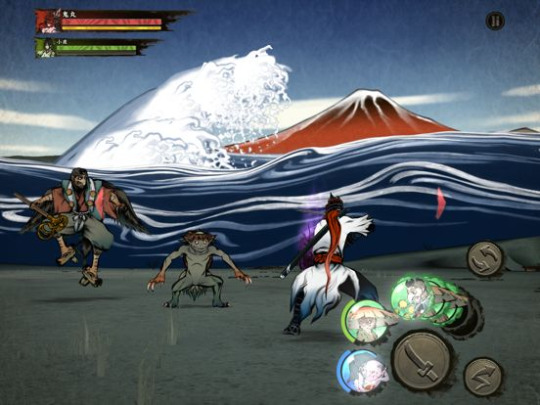
The overall game structure too follows trends of the platform. The game encourages replaying levels with ratings and random drops, and grinding is required at times to progress or at least make your numbers go up enough. A bonus level requires a premium currency to enter, a likely vestige of a free-to-play microtransaction-driven business model which many Apple Arcade games retain even after being retrofitted for the paid service. It never fails to give these games an uncanny feeling of being neither fish nor fowl.
Anyway. The game feels good to play, those well-honed Platinum mechanics in a more accessible framework. There's one main attack button, although different weapons have tweaked attack strings and unique special moves. The dodge button gets a lot of play with well-timed activation giving you a counter. You unlock new characters for a total of four, and they each play quite differently (I favoured a combo of the fast, range-focused shrine maiden Sayo and the cursed Buddhist monk Dohzen who is slow and strong).
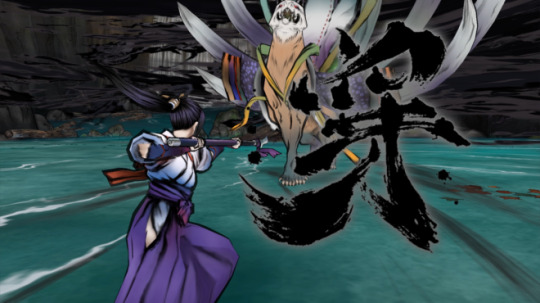
But the main gimmick of the game is the recruitable yōkai. These spirits and creatures of legend are the main enemies of the game and a constant stream of new ones keeps the battling fresh. When defeated they drop orbs which let you summon them for a one-time attack or effect. You also unlock permanent versions which can be enhanced, and each level lets you pick two per character to bring with you. (I usually made sure to pick at least one that would draw enemy aggro.) This is a fun way of customising your playstyle and experimenting with combinations, although with the length of the levels it's better to keep experimentation to the short sidequests lest you be punished for a poor choice.
The yōkai also have some use outside of battle, as there's a limited version of Okami's environmental puzzles. Some objects can be interacted with for a few items or an extra battle, but only if you have the right type of yōkai equipped. Since choices are restricted, and you might not get the right drop or know to save it, it's easy to be stuck without the right tools for these and feel left out; and replaying levels can feel a chore. It feels like a half-baked system, often punishing you for poor luck rather than rewarding you for smart play.
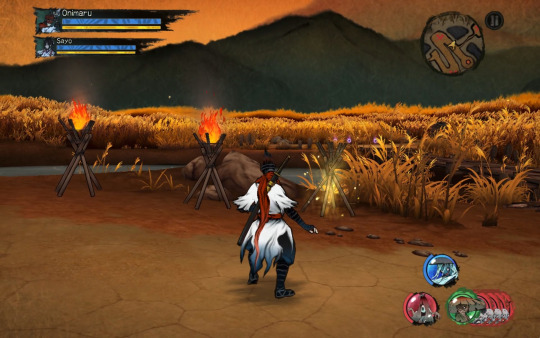
The story is pretty standard demon-and-samurai stuff, with a series of amusingly improbable revelations about character relationships as you go on. It's decent enough with a bit of flair, much like the character designs. It must be noted that after four chapters building to a climax, there's a cheap undercut seemingly setting up an Okami-style next phase (complete with a "to be continued" screen as with all the other chapters), only for the game to just not have any more content. I guess they released the game unfinished, expecting to add more story in later updates, as with Castlevania Grimoire of Souls, or Shantae and the Seven Sirens? But with over a year since the last update, who knows when or if it will indeed be continued.
Either way, what's here is a neat package. In fact I'm glad it didn't drag on too long as Okami did at times. The heavily cel-shaded art style invoking traditional ink painting is a great look, and the game systems are solid save for the yōkai interactions. It's not quite an Okami 3 but there's enough DNA here for it to be maybe an Okami 2.5, and for that reason it was a cool novelty for me.
10 notes
·
View notes
Note
a package is set on the corner of her desk, paper brown bag crinkled and fragrant. within the steaming confines, namely - a double cheeseburger, sesame speckled bun boxed and neat; a medium fry practically dripping with grease, a plastic tub of BBQ sauce smeared with condensation and a frozen cola smoothie rattling half ice and half meltwater - all trademark fast food specials.
a handwritten note accompanies the bag.
‘ leave the apple slices and toy for Bladie please! ;) ’
score, kafka hadn’t forgotten her order, of course she hadn’t, it would have been very out of character for her to freely forget anything. she had this penchant for filing away important details, weaknesses, strengths, for combat where their individual abilities and stats would become crucial to the success of their mission. It didn’t matter if it were dailies ( chores ) or more intricate commissions ( missions, usually over complicated and assigned by elio no doubt ) all of them became things to consider when one was needlessly attached to the script. silver wolf knew alot about scripts, dismantling them, rewriting them, distorting them into debased replicas of their original content, elio’s script was pretty elusive to her, but it didn’t hold her interest that much either. “ ugh, he’s so fussy.” she rolled her eyes, ignoring the delicately sliced apples that blade requested had no skin and the gaudy, yellow-ish toy thing that he had also staked claim on, kinda weird, and reached for her burger. it smelt divine. the diner should know her order by heart now, and also know the tirade of negative online reviews they would receive if they made even the slightest mistake. she wasn’t captious, she just believed in getting what you paid for, they would do well to remember that. as she slurps nosily on her coke she turns the toy over in her hand, it was a plastic replica of a samurai, his little screwed up face even kinda looked like blade when she held it in the right light. she tossed it into the bag, miraculously texting kafka without so much as getting a smear of the exorbitant amount of grease at her disposal on the screen.

“ great job kafka, 10/10, would defs accept you as my uber delivery guy.” and it was accompanied by a winking emoji of a wolf giving a distinct and rather jaunty thumbs up.
2 notes
·
View notes
Text
So I watched The Critical Drinker's review of Blue Eyed Samurai and Spoiler Alert he likes it.
The comment section was tamer than I thought. Perhaps it's me becoming more puprlepilled by the day but yeah.
There were some commenters who were willing to dismiss the show as woke due to modern year and era. Fuck those guys.
The Drinker didn't pull his usual echoey bullshit. Did it twice though but not in the very obnoxious way. He just said it to accentuate his point. Overall, he didn't sound obnoxious in his review. Guess when he approves of the show, he doesn't sound like an obnoxious twat.
Although there were some comments saying that The Drinker has fallen for the woke mind virus but yeah. That's bound to happen.
Why do I care about The Drinker? Like it or not, he does make some nice reviews and he's not like other anti-woke content creators. He actually takes the time to show you what's up.
I was kinda misapprehensive about his Arcane review since I watched Gigguk's review before Arcane and since Arcane is LoL and that gives me familiarity with the subject, the Drinker's review seems to be a bit lacking.
I also would like to see what the anti-woke are up to and the best way to check is with him. He is by far the least vitriolic mofo from the anti-woke community, that is subject to change. I also would like to test myself to see if I still get somewhat offended and if so, course correct and have something to contemplate about while doing my tasks at work. I've been thinking about some woke and anti-woke stuff and I wanted to see what's up.
It's just that it really peeves me at times, as whenever I try to think of anti-woke stuff and it makes me think of sad thoughts as what it would do to mental health when I'm not ready to take such info.
Anywho, I also watched his TLoU2 review and eh, while the Ellie is gay btw segments were a tad obnoxious like a bad conservative joke, it was generally not bad. Gave me the idea to try Dying Light as well. I wanna check that out. When I can.
Hmmmm.
3 notes
·
View notes
Text
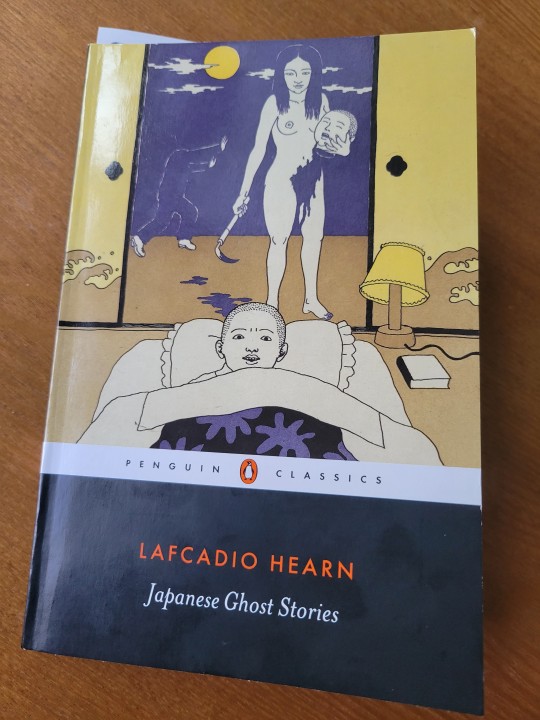
Japanese Ghost Stories. By Lafcadio Hearn (ed. Paul Murray). Penguin Books, 2019.
Rating: 4/5 stars
Genre: Japanese folklore, late 19th-early 20th century literature
Series: N/A
Summary: In this collection of classic ghost stories from Japan, beautiful princesses turn out to be frogs, paintings come alive, deadly spectral brides haunt the living, and a samurai delivers the baby of a Shinto goddess with mystical help. Here are all the phantoms and ghouls of Japanese folklore: 'rokuro-kubi', whose heads separate from their bodies at night; 'jikininki', or flesh-eating goblins; and terrifying faceless 'mujina' who haunt lonely neighbourhoods. Lafcadio Hearn, a master storyteller, drew on traditional Japanese folklore, infused with memories of his own haunted childhood in Ireland, to create these chilling tales. They are today regarded in Japan as classics in their own right.
***Full review below.***
Content Warnings: blood, body horror, violence
Since this book is an anthology, my review will be structured a little different from normal.
I picked up this book on a whim. I saw it at a book store, and I generally like Penguin Classics, so I figured I'd expand on my knowledge of spooky stuff and give Japanese Ghost Stories a whirl.
Overall, I think this is a good collection, particularly because it focuses on the work of one historic writer/translator: Lafcadio Hearn. I didn't know anything about him going into this book, but the introduction gives readers a pretty good overview about his life, so I found it very helpful. The intro also helped me to orient myself in the time period and literary movements in which Hearn was working and reminded me that what we're reading isn't necessarily Japanese literature written by Japanese people (though it kind of is), but a late 19th-early 20th century translator's interpretation of Japanese tales. While we may have some qualms over who is allowed to tell what stories, I do think studying the work of translators like Hearn tells us something about the literary movements of the time and the way Orientalism may or may not function, so for that, this book is incredibly useful.
But that being said, I can't say I walked away with a greater understanding of Japanese folklore. I gleaned what I could through osmosis, but I found it very difficult to understand certain parts of the tales because infornation is split between footnotes and endnotes. There also wasn't a lot of critical apparata to help assist me with putting Hearn's work in a Japanese context, so it was difficult to connect individual stories to particular aspects of Japanese history or culture. Perhaps this is beyond the scope of the book, though, because it's not really a collection of Japanese Ghost Stories but a collection of Hearn's Japanese Ghost Stories. I think that distinction is important and will affect how readers approach this volume.
TL;DR: Japanese Ghost Stories is a good collection of tales that focuses on the translation work of a single author at the turn of the century. While the Penguin edition offers little in terms of critical support and can be difficult to read because of the split between footnotes and endnotes, overall, the selection is good and each tale is short enough for readers to get a quick scare between other reads or at free moments throughout the day.
4 notes
·
View notes
Text
Review for Turning Point 1997-2008 by Hayo Miyazaki
I've always been a fan of Studio Ghibli's work and have always wanted to know more about the inspiration behind these movies as well as the deeply personal connection Miyazaki has to these films.
The first part of this book covers Princess Mononoke (1997) which i had watched just before finding this book. Looking back it was rather Naïve of me to not see the clear use of Japanese folklore in the film as well as the use of history to support the narrative. Something that I found interesting was the Miyazaki's desire to create a more realistic Japanese period drama that focused on the common people to counter the overwhelming amount of dramas focused on samurai and the nobility. The iron workers in the film are actually inspired by folktales of demonic mountain spirits that appeared due to the injuries that the workers commonly experienced (such as losing limbs and burns) which further adds to the fantasy elements of the film.
A common theme through out the whole book is Miyazaki's own distaste for the over teaching and over protection of children in the modern age. He argues that there isn't a need for children to learn the multiplication tables in the 2nd grade as the numbers are too abstract of a concept for them to understand. This made me reflect on my own time in primary school and realising that I rarely used the multiplication tables outside of the class room at all, only ever needing to use simple addition.
The book provided insight for the workings of the studio which revealed a culture of crunching to get movies finished on time and as on budget as possible. What also interested me was the commitment of Miyazaki to cater to children and encourage their curiosity and adventurous nature before they become adults, he did this through the design of the Studio Ghibli Museum and Ghibli's own nursery for it's employee's children.
The collections of essays often don't focus on the films of the studio which was most prevalent in the part of Howl's moving castle which had the least movie related content.
In conclusion: highly recommend if you are interested in Studio Ghibli's work or the world views of Hayo Miyazaki himself, but be aware that not all the films are given the same level of depth.
3 notes
·
View notes